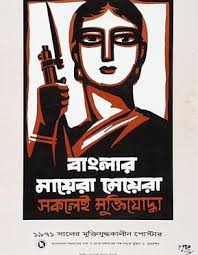A woman’s war is distinct. She not only has to be a fighter, but also is expected to maintain and eventually return to her traditional role as a mother, wife, and anchor of the family at the end of the conflict. Bangladeshi women played key roles during and after the 1971 war, serving as combatants, informants, nurses, weapons smugglers, and more.
 |
| A Poster during The Liberation War of 1971 |
War heroes include those women who have supported the valiant freedom fighters with food, shelter, funds; who have nursed the wounded and hide weapons risking their own lives. They also include those who have willingly given their sons to war, who have lost their loved ones and even worse been subjected to sexual abuse and still survived to tell their stories.Bengali women had contributed so much to the war. They devoted themselves to taking care of the refugees in the camps and even took up arms to fight as part of the Mukti Bahini. They collected and distributed clothes and other necessary items for the children in the refugee camps. They took part in activities of the Mujibnagar government-in-exile who had their headquarter in Kolkata.
Women underwent training on guerrilla warfare and first aid - in
 |
| The Women Freedom Fighter of '71 |
some instances there were more than 200 women in the training camp. Most of them had lost their family members and were resolute to take revenge. The food they used to get at the training camp was paltry but that didn't bother the camp inmates.
One such woman was Taramon Bibi. She joined the Sector 11 (Mymensingh-Tangail) camp commanded by Major Abu Taher initially as a cook and a cleaner. But noticing her resilience, bravery and strength, Taramon's godfather Muhib Habildar motivated her to become a freedom fighter. He taught her how to use arms like rifles and stein gun. Some women even tied grenades to their bodies and threw themselves on the road in order to kill as many of the enemies as possible.
Many women assisted at the 480-bed hospital in Agartala, Tripura (east of Bangladesh), known as the 'Bangladesh Hospital'. Here they treated injured freedom fighters and cared for their well-being. This group of young women put their heart and soul into their job as medical attendants and consoled themselves in the knowledge that helping out at the hospital was almost as good as fighting in the war. This group were led by Dr. Sitara Begum, the only other woman to be awarded the 'Bir Protik' along with Taramon Bibi. She was a lieutenant at the start of the war, but promoted to Captain by Colonel Osmani.
 |
| One Of Freedom Fighter in 1971 |
Similar to Bir Protik Taramon Bibi and Dr. Captain Sitara Begum many countless women carried out heroic deed during the war but they've gone unnoticed. It is an unfortunate characteristic of human beings, in general, around the world to neglect the veterans of war - both men and women. Their bravery and sacrifice for the greater good of humanity provides inspiration, but their are abandoned after the war and left to look after themselves.

On 4th April 1970 poet and social reformer Begum Sufia Kamal founded the Bangladesh (then East Pakistan) Mahila Parishad (Women's Council of Bangladesh), a women's human right organization. During the Shadinota Juddho they published an emotionally powerful book "To the Conscience of People" (1971) from within the blockaded Dhaka city. It contained photographs and vivid description that showed how Bengali women were tortured by the officers and soldiers of the West Pakistan army and by their collaborators
Another powerful book that was written during 1971 was "Ekatturer Dinguli" (The days of '71) by Jahanara Imam. It is a diary of her personal account of the Bangladesh Liberation War tragedy in which she lost her eldest son Shafi Imam Rumi, aged 19, and her husband, who died three days before Victory Day of 16 December 1971.
The vast majority of the coverage of women’s role in the 1971 war has centered on women as victims. However, even under such harrowing atmosphere and personal grievances, women fought in the war in so many different ways. They were active and willing participant in the fight for Bangladesh's independence
Photo Courtesy: Website

No comments:
Post a Comment